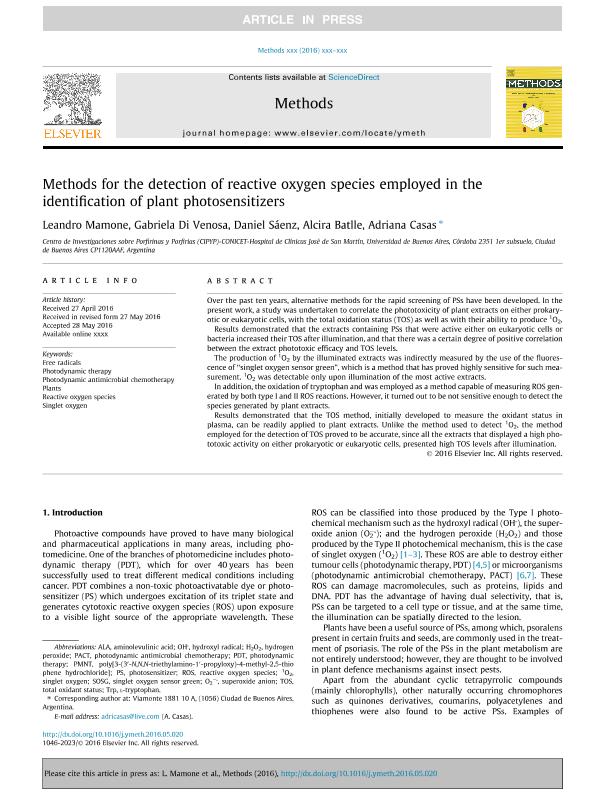Mostrar el registro sencillo del ítem
dc.contributor.author
Mamone, Leandro Ariel

dc.contributor.author
Di Venosa, Gabriela Mariana

dc.contributor.author
Saenz, Daniel Alberto

dc.contributor.author
Batlle, Alcira María del C.

dc.contributor.author
Casas, Adriana Gabriela

dc.date.available
2018-06-01T19:51:06Z
dc.date.issued
2016-10
dc.identifier.citation
Mamone, Leandro Ariel; Di Venosa, Gabriela Mariana; Saenz, Daniel Alberto; Batlle, Alcira María del C.; Casas, Adriana Gabriela; Methods for the detection of reactive oxygen species employed in the identification of plant photosensitizers; Academic Press Inc Elsevier Science; Methods; 109; 10-2016; 73-80
dc.identifier.issn
1046-2023
dc.identifier.uri
http://hdl.handle.net/11336/47027
dc.description.abstract
Over the past ten years, alternative methods for the rapid screening of PSs have been developed. In the present work, a study was undertaken to correlate the phototoxicity of plant extracts on either prokaryotic or eukaryotic cells, with the total oxidation status (TOS) as well as with their ability to produce 1O2. Results demonstrated that the extracts containing PSs that were active either on eukaryotic cells or bacteria increased their TOS after illumination, and that there was a certain degree of positive correlation between the extract phototoxic efficacy and TOS levels. The production of 1O2 by the illuminated extracts was indirectly measured by the use of the fluorescence of “singlet oxygen sensor green”, which is a method that has proved highly sensitive for such measurement. 1O2 was detectable only upon illumination of the most active extracts. In addition, the oxidation of tryptophan and was employed as a method capable of measuring ROS generated by both type I and II ROS reactions. However, it turned out to be not sensitive enough to detect the species generated by plant extracts. Results demonstrated that the TOS method, initially developed to measure the oxidant status in plasma, can be readily applied to plant extracts. Unlike the method used to detect 1O2, the method employed for the detection of TOS proved to be accurate, since all the extracts that displayed a high phototoxic activity on either prokaryotic or eukaryotic cells, presented high TOS levels after illumination.
dc.format
application/pdf
dc.language.iso
eng
dc.publisher
Academic Press Inc Elsevier Science

dc.rights
info:eu-repo/semantics/openAccess
dc.rights.uri
https://creativecommons.org/licenses/by-nc-sa/2.5/ar/
dc.subject
Free Radicals
dc.subject
Photodynamic Therapy
dc.subject
Photodynamic Antimicrobial Chemotherapy
dc.subject
Plants
dc.subject
Reactive Oxygen Species
dc.subject
Singlet Oxygen
dc.subject.classification
Otras Ciencias Biológicas

dc.subject.classification
Ciencias Biológicas

dc.subject.classification
CIENCIAS NATURALES Y EXACTAS

dc.title
Methods for the detection of reactive oxygen species employed in the identification of plant photosensitizers
dc.type
info:eu-repo/semantics/article
dc.type
info:ar-repo/semantics/artículo
dc.type
info:eu-repo/semantics/publishedVersion
dc.date.updated
2018-06-01T19:20:39Z
dc.journal.volume
109
dc.journal.pagination
73-80
dc.journal.pais
Estados Unidos

dc.journal.ciudad
San Diego
dc.description.fil
Fil: Mamone, Leandro Ariel. Consejo Nacional de Investigaciones Científicas y Técnicas. Oficina de Coordinación Administrativa Houssay. Centro de Investigaciones sobre Porfirinas y Porfirias. Universidad de Buenos Aires. Centro de Investigaciones sobre Porfirinas y Porfirias; Argentina
dc.description.fil
Fil: Di Venosa, Gabriela Mariana. Consejo Nacional de Investigaciones Científicas y Técnicas. Oficina de Coordinación Administrativa Houssay. Centro de Investigaciones sobre Porfirinas y Porfirias. Universidad de Buenos Aires. Centro de Investigaciones sobre Porfirinas y Porfirias; Argentina
dc.description.fil
Fil: Saenz, Daniel Alberto. Consejo Nacional de Investigaciones Científicas y Técnicas. Oficina de Coordinación Administrativa Houssay. Centro de Investigaciones sobre Porfirinas y Porfirias. Universidad de Buenos Aires. Centro de Investigaciones sobre Porfirinas y Porfirias; Argentina
dc.description.fil
Fil: Batlle, Alcira María del C.. Consejo Nacional de Investigaciones Científicas y Técnicas. Oficina de Coordinación Administrativa Houssay. Centro de Investigaciones sobre Porfirinas y Porfirias. Universidad de Buenos Aires. Centro de Investigaciones sobre Porfirinas y Porfirias; Argentina
dc.description.fil
Fil: Casas, Adriana Gabriela. Consejo Nacional de Investigaciones Científicas y Técnicas. Oficina de Coordinación Administrativa Houssay. Centro de Investigaciones sobre Porfirinas y Porfirias. Universidad de Buenos Aires. Centro de Investigaciones sobre Porfirinas y Porfirias; Argentina
dc.journal.title
Methods

dc.relation.alternativeid
info:eu-repo/semantics/altIdentifier/doi/https://dx.doi.org/10.1016/j.ymeth.2016.05.020
dc.relation.alternativeid
info:eu-repo/semantics/altIdentifier/url/https://www.sciencedirect.com/science/article/pii/S1046202316301530
Archivos asociados
